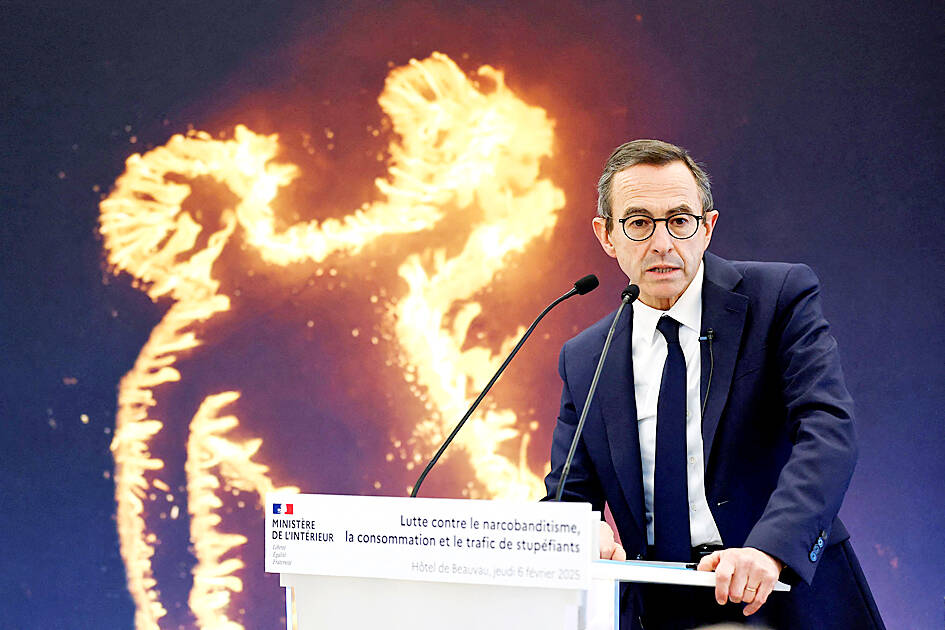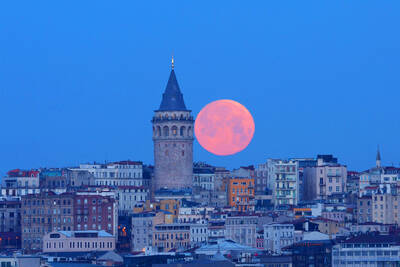French police on Monday arrested a man in his 20s on suspicion of murder after an 11-year-old girl was found dead in a wood south of Paris over the weekend in a killing that sparked shock and a massive search for clues.
The girl, named as Louise, was found stabbed to death in the Essonne region south of Paris in the night of Friday to Saturday, police said.
She had been missing since leaving school on Friday afternoon and was found just a few hundred meters from her school.

Photo: Reuters
A police source, who asked not to be named, said that she had been “hit more than 10 times by an object that could have been a knife,” particularly in the torso and neck.
French police arrested a man aged 23 on suspicion of murdering a child aged under 15, prosecutors said.
His mother, aged 55, has also been detained in the case on suspicion of failing to report a crime.
A couple in their 20s were detained on Saturday as part of the investigation, but were released without any further proceedings at this stage, prosecutors said.
While the circumstances of the killing remain unexplained, it comes at a time when law and order, and in particular crimes against children, are major issues in French politics and society.
“An innocent life was torn away from life and the love of her family. We are in the process of the investigation, but sadness and anger are overwhelming every French person,” French Minister of the Interior Bruno Retailleau said.
About 120 members of the security forces were deployed on Sunday at Longjumeau wood where the body was found, seeking any clue that could lead police to the perpetrator, prosecutors said.
The police source said that the victim’s mobile phone was found close to the body.

ANGER: A video shared online showed residents in a neighborhood confronting the national security minister, attempting to drag her toward floodwaters Argentina’s port city of Bahia Blanca has been “destroyed” after being pummeled by a year’s worth of rain in a matter of hours, killing 13 and driving hundreds from their homes, authorities said on Saturday. Two young girls — reportedly aged four and one — were missing after possibly being swept away by floodwaters in the wake of Friday’s storm. The deluge left hospital rooms underwater, turned neighborhoods into islands and cut electricity to swaths of the city. Argentine Minister of National Security Patricia Bullrich said Bahia Blanca was “destroyed.” The death toll rose to 13 on Saturday, up from 10 on Friday, authorities

DEBT BREAK: Friedrich Merz has vowed to do ‘whatever it takes’ to free up more money for defense and infrastructure at a time of growing geopolitical uncertainty Germany’s likely next leader Friedrich Merz was set yesterday to defend his unprecedented plans to massively ramp up defense and infrastructure spending in the Bundestag as lawmakers begin debating the proposals. Merz unveiled the plans last week, vowing his center-right Christian Democratic Union (CDU)/Christian Social Union (CSU) bloc and the center-left Social Democratic Party (SPD) — in talks to form a coalition after last month’s elections — would quickly push them through before the end of the current legislature. Fraying Europe-US ties under US President Donald Trump have fueled calls for Germany, long dependent on the US security umbrella, to quickly

Local officials from Russia’s ruling party have caused controversy by presenting mothers of soldiers killed in Ukraine with gifts of meat grinders, an appliance widely used to describe Russia’s brutal tactics on the front line. The United Russia party in the northern Murmansk region posted photographs on social media showing officials smiling as they visited bereaved mothers with gifts of flowers and boxed meat grinders for International Women’s Day on Saturday, which is widely celebrated in Russia. The post included a message thanking the “dear moms” for their “strength of spirit and the love you put into bringing up your sons.” It

RARE EVENT: While some cultures have a negative view of eclipses, others see them as a chance to show how people can work together, a scientist said Stargazers across a swathe of the world marveled at a dramatic red “Blood Moon” during a rare total lunar eclipse in the early hours of yesterday morning. The celestial spectacle was visible in the Americas and Pacific and Atlantic oceans, as well as in the westernmost parts of Europe and Africa. The phenomenon happens when the sun, Earth and moon line up, causing our planet to cast a giant shadow across its satellite. But as the Earth’s shadow crept across the moon, it did not entirely blot out its white glow — instead the moon glowed a reddish color. This is because the